How To Interview Your Technical Diving Instructor
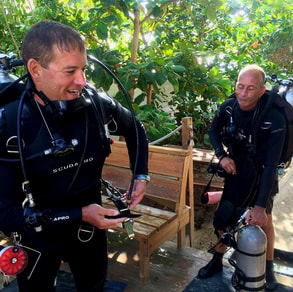 Look for a Mentor-Apprentice relationship over Teacher-Student Look for a Mentor-Apprentice relationship over Teacher-Student Technical diver training is a heavy investment in your development and like any investment; you want to ensure the best return. Your Tec Instructor should be able to personalize their courses to best suit your needs. They should be able to adapt their teaching style to best match your learning style. Their diving philosophies need to be aligned with your diving goals. Your relationship to your Tec Instructor should be more Mentor-Apprentice than Teacher-Student, so even personalities play a part in a successful long term bond.  So many agencies... How do you choose? So many agencies... How do you choose? Instructor or Agency? TDI, IANTD, PADI TEC, RAID, NAUI TEC, SSI XR, Uncle Bob’s Tec Training Agency… (I made that last one up, but every Dive Instructor has thought of starting their own agency and some actually have, with varying degrees of success.) How do you choose between them? Simple: you don’t! Finding your ideal Instructor is so much more important than picking a training agency or course. As a student, you’re not going to have contact with the training agency, the agency won’t be in the classroom or underwater with you and they won’t be there to make recommendations for helping you reach your goals, other than ‘buy another course from us.’ As long as the course outlines help you meet your personal goals; the courses are internationally recognized and accredited; and the training materials are of a high quality and accessible to you, that’s about as much consideration as you need to give picking an agency. The major training agencies structure courses that are equivalent of one another, so an attitude of ‘I really like this Instructor, but he only teaches agency-x and I want to do agency-y’s courses’ is shortsighted. And even if you do have a preference as to agency and courses, perhaps because you like their course materials or they have a pretty website, you could line ten instructors up to teach the same course and they’d teach it eleven different ways, all keeping within standards, but all with their own interpretive style and focus. So how would you know which of the ten to choose? 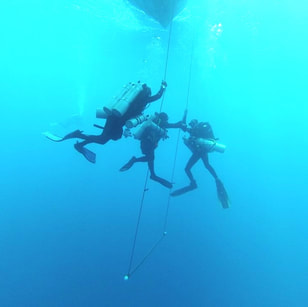 The author, hanging with his buddies The author, hanging with his buddies Here are eight questions for you to ask your potential Technical Diving Instructor, why to ask them, and some suggestions as to what I believe would be bankable answers. 1. How many Tec dives do you do a year, not including classes? If your potential Tec Instructor only dives for courses, a number of complacencies can set in. For me, going on Tec Dives for fun is important for the following reasons: diving with my peers reminds me why people would want to get into this sport; it allows me to further my own training and skills practice so I stay sharp; and it allows me to experiment with new sites and new gear and configurations I wouldn’t try whilst supervising students. If an Instructor only performs Technical dives whilst teaching a course, they risk becoming stagnant and complacent both of which are dangerous. 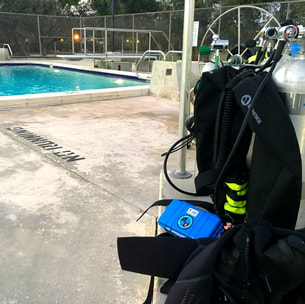 Additional pool sessions help refine skills. Additional pool sessions help refine skills. 2. What do you teach in your courses, besides the minimum standards? Take any agency, any course. Look at the training standards and remember: these are the minimum requirements for certification. In other words, the lowest passing grade. If your Tec Instructor issues your certification having dogmatically stuck to the course outline without teaching you anything above or beyond it, know that you’re scraping through on a C-grade. My first question to any potential student is: What are your diving goals? From their answer, I like to build in additional rescue/safety scenarios, detailed equipment specialty classes, optional extra skill circuits as well as prescriptive theory sessions personalized to get them where they want to go. I even like to recommend further reading titles to encourage students to continue their studies after our class is complete. I want my students passing with A+ grades. 3. How would you describe your teaching style? Some people respond to the drill sergeant. Some prefer the art therapist. Some like the carrot, others need the stick. If you’re honest with yourself about how you learn, you’ll better know what you need in your Instructor’s style. An Instructor who wants to appeal to as many potential students as possible is one who can adapt their teaching style to match their students needs. 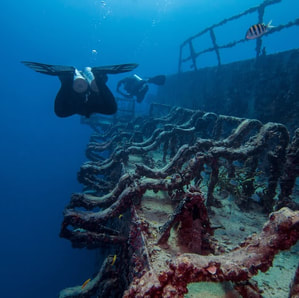 How far can your Tec Instructor take you? How far can your Tec Instructor take you? 4. What is your highest qualification? If you find a Tec Instructor who’s philosophy and teaching style gels with how you like to learn, it’s nice to know you can develop under their mentorship. It’s always worth asking how far down the path they can lead you. Conversely, it’s also beneficial to get lessons from a few different, carefully-selected instructors to benefit from a wider breadth of knowledge and experience. 5. What size classes do you teach?/How much are your courses? This is important practical knowledge to help you visualize how your class will feel. If your Instructor teaches in groups of four, the cost of the course should be cheaper, but you can also only realistically expect ¼ of your Instructor’s attention. An Instructor dedicated to teaching 1:1 will be more expensive, because they need to cover their costs off of less people, but you can expect their undivided attention. If cost is factoring into your decision on which Instructor to go with, you should hold off on purchasing training until you can afford to train with the Instructor you want. Nobody wants the cheapest parachute. Be prepared to budget for travel costs if you don’t have an Instructor in your area that you’re happy with, or consider training that includes accommodation. 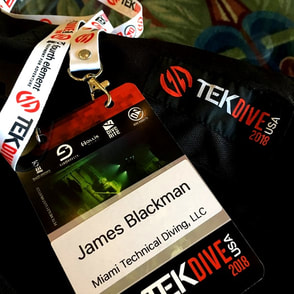 Conferences are a great way to stay current on the latest developments Conferences are a great way to stay current on the latest developments 6. How do you keep yourself up-to-date on industry developments? Technical diving is evolving at a rate of knots, so it’s important your potential Instructor keeps themselves fresh, so that they can pass on the most up-to-date information to their students. I like to pick up tips and tricks from various trustworthy social media sources, industry leaders I meet at conferences as well as staying up to date with the latest science regarding decompression theory and dive medicine. Again, it’s about not allowing yourself to stagnate. 7. What are your scuba diving goals? Is your Tec Instructor continuing their own education? Do they still have unchecked items on their scuba bucket list? Sometimes when you play the teacher for so long, you can forget what courses look like from the perspective of the student. Setting goals is essential in this discipline, for exactly that reason; it keeps you disciplined. Beware the Instructor who has no goals set for themselves… how will they help you reach yours? 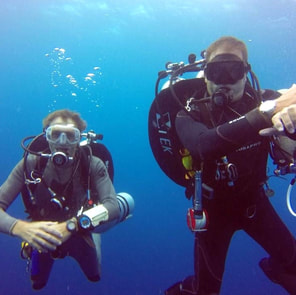 Extra dives allow time for fun skills practice. Extra dives allow time for fun skills practice. 8. How often do your students require remedial training? Haha! A trick question. The novice Tec Instructor would be scared to admit that their students need extra dives or remedial training for fear it makes them look like they did a poor job in class. The honest answer is that nearly all entry-level Tec students need some kind of extra tutelage. The leap from Rec to Tec, just in terms of mastery of foundation skills, is vast. More often than not, my students need extra dives just to get used to buoyancy, breathing, trim and finning techniques in the new equipment configuration. There’s no shame in that. The only shame would be graduating a student who hasn’t met elite performance requirements because they’ve completed the ‘minimum dives required.’ For example: Foundational courses TDI Advanced Nitrox and TDI Decompression Procedures, when taught together, require a ‘minimum of six dives.’ But if you’ve never dived doubles/sidemount before, then achieving mastery of the basics in six dives is nearly impossible. Understand that going into a Tec course and expecting to get everything right in the minimum number of dives is unrealistic. Look for an Instructor who automatically factors extra time into the schedule for more dives, pool sessions, theory… whatever areas of your training you need to achieve elite diver performance. In Summary...
Choose an Instructor who:
1 Comment
6/19/2018 12:32:47 pm
Interviewing your technical diving instructor is not totally different from interviewing someone else who belong to other field. Of course, there are several preparations that you have to make so that you'll be able to throw worthy questions to your interviewee. As much as possible, you need to be engaged on the conversation. You need to let your interviewee feels that you are at the moment and you absorb everything he said. I know that it is not an easy task, but with the right amount of focus, I know you can do that!
Reply
Leave a Reply. |
AuthorJames Blackman Archives
November 2018
Categories |
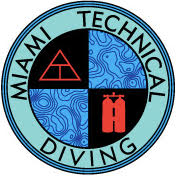
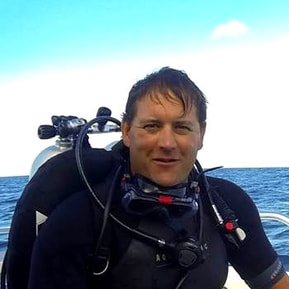
 RSS Feed
RSS Feed